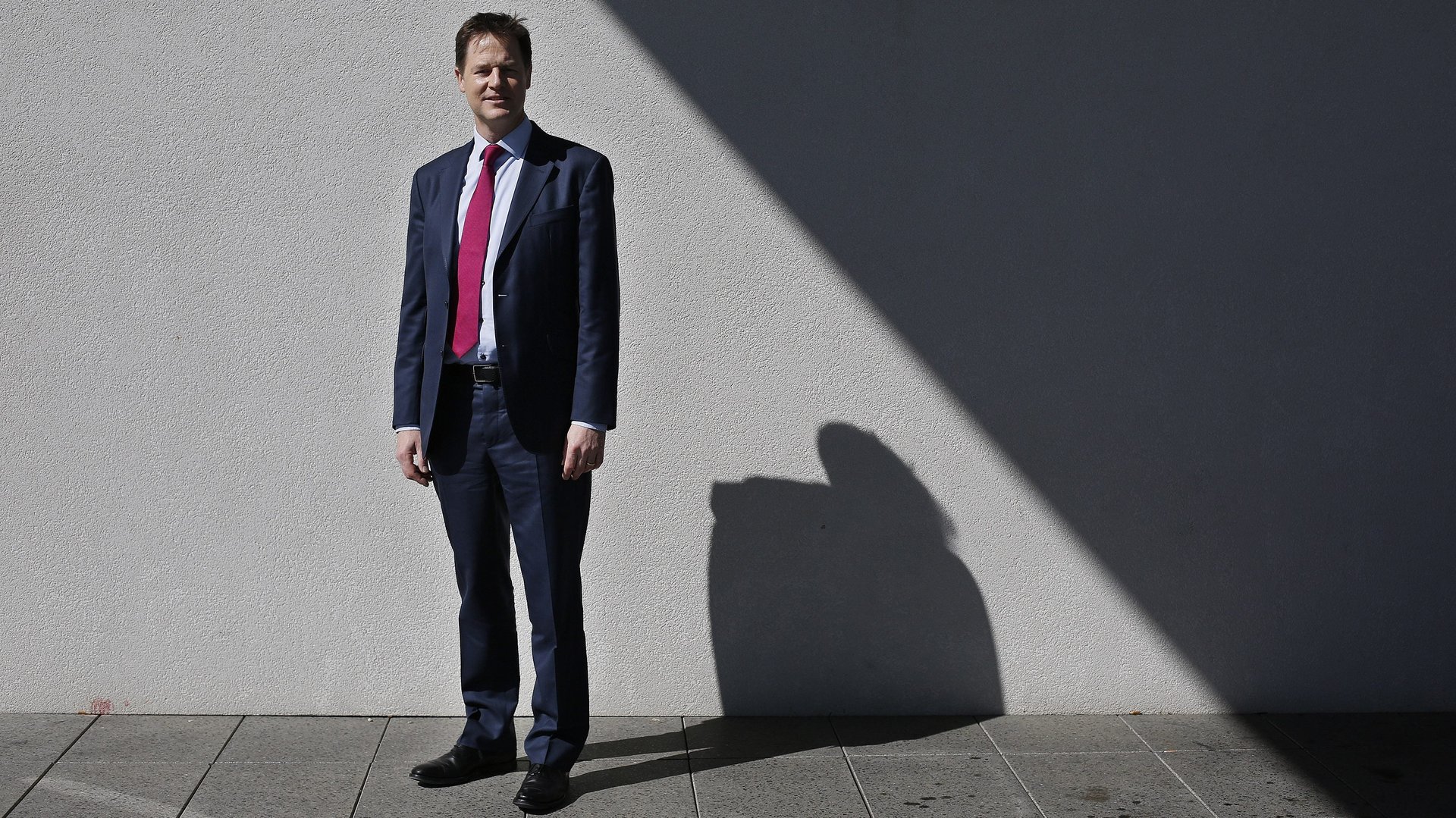Nick Clegg, Facebook’s lead apologist, used to be a political idealist
Nick Clegg hasn’t had an easy career.


Nick Clegg hasn’t had an easy career.
Most recently, as Facebook’s vice president for policy and global affairs, Clegg has had the job of responding to whistleblower Frances Haugen’s accusations about the impact of Facebook—and Whatsapp and Instagram, which it owns—on everything from US political polarization to the body image issues of teenage girls. He did so with a 1,500-word memo to Facebook staff, and in a television appearance on CNN’s Reliable Sources, asserting in both that Facebook treats the tasks of minimizing hate speech and making research transparent with the utmost seriousness.
He sounded measured and reasonable. He sounded like he wanted to believe what he’s saying. His former political followers have seen this kind of performance from him before.
Clegg has only worked in the private sector since 2018, when he surprised his fellow Britons by announcing a sudden move to Silicon Valley. Before that, Clegg was the UK’s deputy prime minister from 2010 to 2016. And he made it to that high-profile position via a fairly stratospheric rise based on his apparent political idealism.
The origins of Cleggmania
The UK’s political system, for several decades, has seen two large parties, the Conservatives and Labour, form governments. A third, smaller party, the Liberal Democrats, have never come close to winning a general election, but they often gain a chunk of the seats in parliament and can choose to side with the government or oppose it when voting on specific issues. Clegg became its leader in 2007.
In April 2010, ahead of a general election, Clegg suddenly burst into the public consciousness via a series of televised party-leader debates, the first ever to be held in the UK. Clegg triumphed in the first to such a degree that 61% of respondents to the first substantial post-debate poll had him winning, compared to 22% for Conservative challenger David Cameron and 17% for incumbent Labour prime minister Gordon Brown. As the debate series continued, a phenomenon the press dubbed “Cleggmania” spread across the UK.
Clegg sounded excited and energized. He sounded like he absolutely believed what he was saying.
Ultimately, David Cameron’s Conservatives won the election, but without a majority large enough to form a government—the first time this had happened since 1974. He invited Clegg to form a coalition, with Clegg as deputy PM.
The painful reality of power
Throughout those four years, the experience looked, from the outside, like a terrible ordeal for Clegg. He had the power and visibility to be at the forefront of any policy development, but not enough—apparently—to stick to his promises. In November 2010 the government raised university tuition fees to a maximum of £9,000 a year ($12,260) from £3,290, a policy which Clegg had pledged to oppose, and for which he apologized.
In 2011, a referendum to reform the voting system, another pillar of Lib Dem ideology, went awry with confusing wording and poor communication. Many people simply didn’t understand the choice they were being presented with. The majority of those who voted chose to stick with the current system which, among other things, favors the large parties over smaller ones and makes coalitions less likely.
In 2015, after big losses for the Liberal Democrats in another general election, Clegg resigned. Then, in 2016, came the decisive blow of the Brexit referendum. Pro-Europe Cameron called the referendum with a plan to silence the Brexit camp forever. Instead, the country voted to leave, by a tiny margin. Cameron resigned. With his time in power over, Clegg—who had seen his popularity dwindle and his approval ratings turn negative— turned his attention to pro-Europe campaigning, but also—it seems—side meetings with Facebook founder Mark Zuckerberg and COO Sheryl Sandberg.
Clegg is still playing the apologist
Seeing Clegg in his protector-of-Facebook role is still rather mind-bending for those who felt the excitement of those 2010 debates. They might wonder how the man has again found himself as an apologist for higher-ups (Zuckerberg this time instead of Cameron) even though he has moved so far from the political arena where he first fell into that role.
They might wonder how much he believes what he’s saying.
Editor’s note: A previous version of this article said Clegg resigned as deputy prime minister in 2016, after the Brexit vote. He resigned in 2015, after big losses for the Liberal Democrats in a general election.